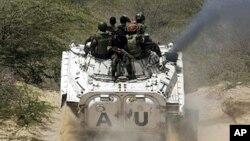The Somali government is claiming victory in a month-long offensive to retake pieces of southern Somalia from the insurgent group al-Shabab. But as fighting continues and the death toll rises, the impact of the recent clashes remains unclear.
There has been relative calm in Somalia’s border regions over the past week as fighting between government forces and al Qaida-linked insurgent group al-Shabab slows and stabilizes. In late February and early March, fighting erupted as the government forces and the joint United Nations-African Union peacekeepers, AMISOM, launched an offensive to retake territory throughout southern Somalia and the capital, Mogadishu.
For nearly two weeks, fighting spilled over the Kenyan and Ethiopian borders near Mandera, raising international alarm and criticism of Somalia’s Transitional Federal Government. The rebel forces have since been pushed back into Somalia and the TFG troops are exercising some measure of control over the area, using it as a base to launch attacks into the Gedo region – a stronghold of al-Shabab.
But according to International Crisis Group Analyst Rashid Abdi, the outcome of the recent violence is not so clear.
“Definitely both sides are claiming victory,” Abdi said. “Towns have changed hands; they are now controlled by the pro-government forces. The government has managed to consolidate its control over two or three, four towns along the border. Now this is a very modest gain and it is by no way an indication that we are beginning to see a roll-back of al Shabab in these territories.”
While fighting does not appear to be finished in Somalia, members of the African Union are praising the operation as a success. Just last week, an AU representative to the U.N. Security Council claimed the government now controlled as much as 60 percent of Mogadishu, with about 80 percent of the population under the aegis of the TFG and AMISOM forces.
But the operation came at a heavy cost: Over 50 AMISOM soldiers were killed in less than a month of fighting. AMISOM’s troops come from Uganda and Burundi, and there is worry that continued losses on the battlefield could affect each nation’s commitment to the Somali mission.
But as ICG’s Abdi points out, there are also serious questions being raised about the long-term strategy underlying the recent violence.
“There is a clear absence of a political strategy,” he added. “This is an exclusive military strategy in the hope that, at some point, there will be positive dynamics from the military offensive which will produce some kind of a political miracle.”
The Somali military is heavily dependent on the 8,000 Ugandan and Burundian troops fighting for AMISOM in Mogadishu. The force has, over the past year, requested funding for more troops to help take full control of the capital. But many observers question whether the TFG or its military is capable of administering and controlling those areas without AMISOM support. Speaking with VOA in Nairobi on Wednesday, Somali Parliamentarian Hassan Ibrahim put it more bluntly:
“The Shabab are much more organized than the government because they have vision, they have morale, they are motivated for their cause. But the government: not. The trooper who is fighting today for the Somali government – who hasn’t been paid in more than a year – his belly is empty. Do you think he can last one hour? No, he can’t.”
Such doubts are part of a growing chorus of discontent aimed at the Transitional Federal Government as it approaches the end of its original mandate in August. Seven years earlier, the TFG was tasked with delivering a new constitution and national elections by 2011. With neither of those goals within reach, the Somali parliament voted to unilaterally extend the government’s mandate by another three years, prompting condemnation from major Somali backers such as the United Nations and United States.
Ibrahim says the current military offensive in Somalia has more to do with validating the TFG extension than actually eliminating al-Shabab and stabilizing the region.
“We’ve wasted seven precious years,” Ibrahim added. “You couldn’t do – all of these seven years – nothing and suddenly in three months or six months of your period you can do something. This is just propaganda and personal gain.”
The shifting lines in Somalia’s turmoil are more complicated than ever but, for now, the international community seems to be taking notice. In recent Security Council discussions, China has urged other nations to recognize Somalia’s instability an underlying cause of piracy, and a threat to international security. Secretary General Ban Ki-moon has also warned the United Nations not to lose focus calling the AMISOM gains “fragile” as “violence continues to rage.”
Results Unclear as Somali Offensive Continues




